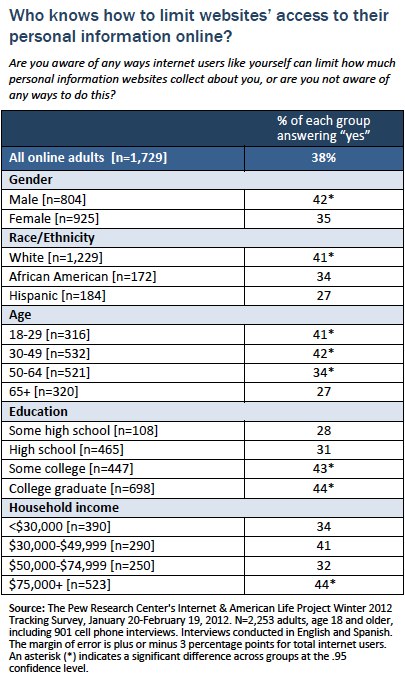Search engine use over time
A February 2012 Pew Internet survey finds that 91% of online adults use search engines to find information on the web, up from 84% in June 2004, the last time we did an extended battery of survey questions about people’s search engine use. On any given day online, 59% of those using the Internet use search engines. In 2004 that figure stood at just 30% of internet users.
As early as 2002, more than eight in ten online adults were using search engines, and as we noted in an August 2011 report4, search is only rivaled by email both in the overall percent of internet users who engage in the activity and the percent of internet users doing it on a given day. The table below shows how search compares over time with some other popular online activities.
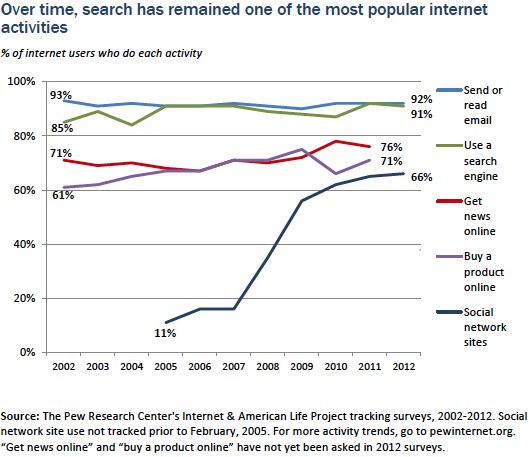
Search is most popular among young adult internet users, those who have been to college, and those with the highest household incomes. These same groups—the young, college-educated, and affluent—are also most likely to report using a search engine “yesterday.” And while white and black online adults are more likely than Hispanics to report using search overall, white online adults stand out from all others as more likely to use search on a given day.
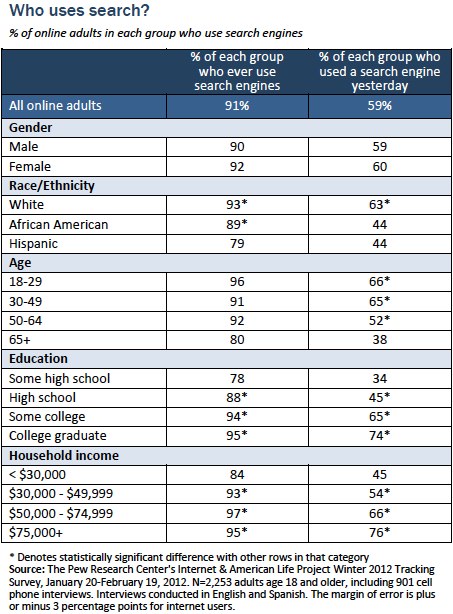
Asked how often they use a search engine to find information online, just over half of all search engine users (54%) say they do this at least once a day, a significant increase over 2004.
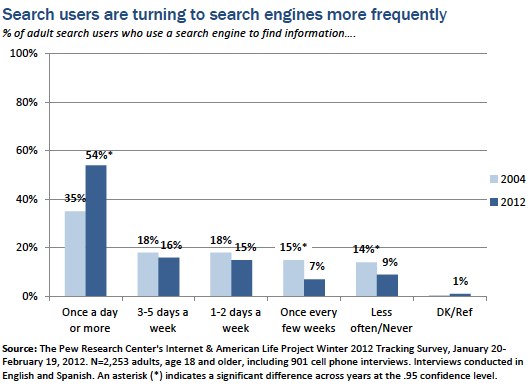
Frequency of search engine use varies by age, education and income, with adults under age 50 and those with more education and higher household incomes using search more frequently than others.
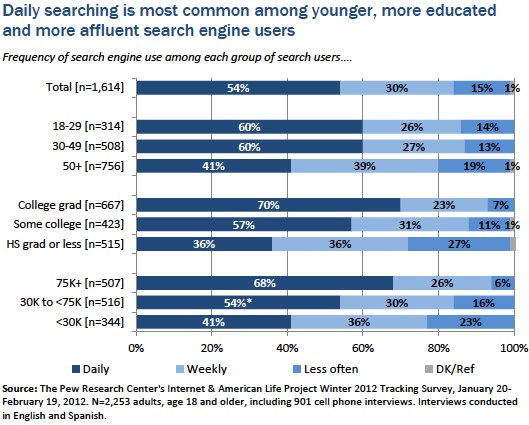
Google is far and away the most popular search engine
Among search engine users, Google dominance continues and it is far and away the search engine they report using most often. Fully 83% of searchers use Google more often than any other search engine. Yahoo is a very distant second at just 6%. In 2004, the gap between these two search leaders was much narrower. At that time, 47% said that Google was the search engine they used most often while 26% named Yahoo.
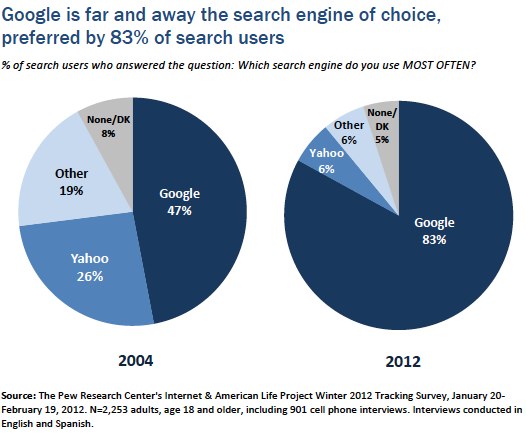
Quality of information
Fairly large majorities of search engine users express confidence in these tools and the results they generate. Not only does a majority believe that search engines are fair and unbiased, they also believe that most results are accurate and trustworthy. And most say that the quality and relevance of search results has been improving over time or has not changed, while very few see the quality and relevance of results declining.
Bias and accuracy
There continues to be widespread faith in search results, and perceptions of fairness and bias have not changed at all over the past eight years. Roughly two-thirds of searchers (66%) say search engines are a fair and unbiased source of information. In 2004, 68% of search users said that search engines were a fair and unbiased source of information.
Asked how much of the information they get in search results is accurate or trustworthy, 28% say all or almost all and another 45% say most.
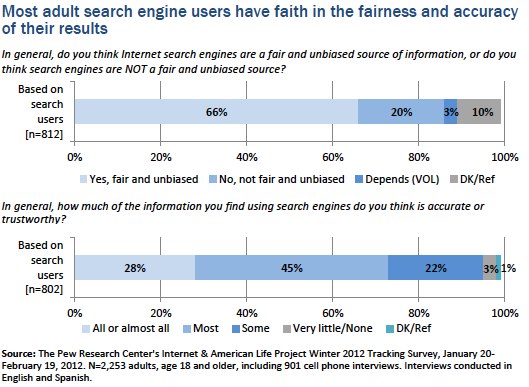
Younger search engine users have more faith in the results they get. 72% of 18-29 year-olds say that search engines are a fair and unbiased source, compared with 65% of 30-49 year-olds, 67% of 50-64 year-olds, and just 54% of search users age 65 and older.
Where accuracy and trustworthiness are concerned, women are slightly more likely than men (76% v. 69%) to feel that all or most of the results they get are accurate and trustworthy. Search users living in the highest income households are also slightly more likely than others to believe that all or most of their results can be trusted.
Relevance and quality over time
Half of adult search users (52%) say search results have gotten more relevant and useful over time, while just 7% see them as getting less relevant or useful. The remaining 40% see no change over time. A similar question about changes in the quality of information over time yields similar results. Just over half of adult search users (55%) say that in their experience the quality of search results has gotten better over time, while 4% say the quality has gotten worse.
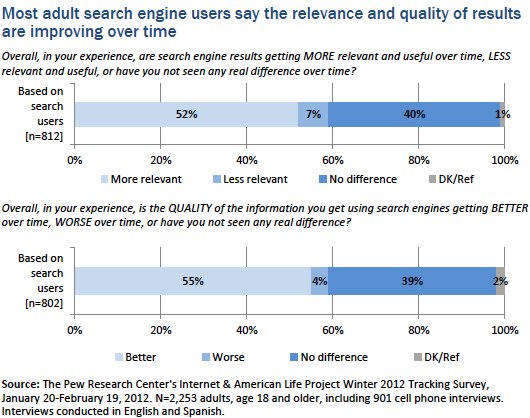
Adult search users under age 50 are slightly more likely than older search users to feel the quality of search results is improving over time. Older adult search users, in contrast, are more likely to see no difference in quality. There are no notable demographic differences where perceptions of relevance are concerned.
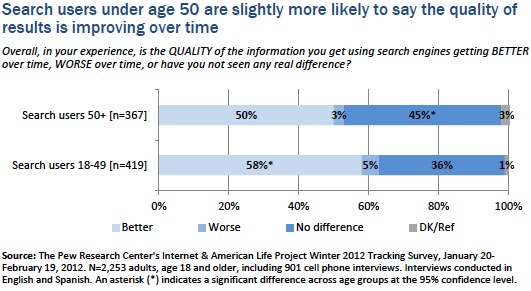
Searchers’ experiences and perceptions of their own abilities
Search engine users not only have confidence in the information they get using these tools, they also have confidence in their own search abilities and report finding what they are looking for most or all of the time.
In 2012, just over half of search users (56%) say they are very confident in their search abilities, which is a small but significant increase over 2004 when 48% felt this confident. Another 37% of search users today describe themselves as somewhat confident, with fewer than one in ten saying they are not too or not at all confident in their ability to use search engines to find information online.
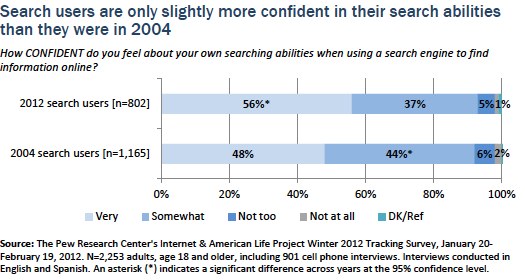
Search users under age 50 are more likely to say they are very confident in their search abilities when compared with those age 50 and older (64% v. 40%), as are search users who have some college education when compared with those who do not (64% v. 45%). And while 68% of adults living in households with incomes of $75,000 or greater say they are very confident in their ability to find information online using search engines, the same is true of only about half of adults in all other income ranges.
In addition to expressing more confidence, search users in 2012 are also slightly more likely than they were in 2004 to say that they always find the information they are looking for. While 29% of search engine users today say this is the case, just 17% reported the same in 2004. Still, in both 2012 and 2004, the majority of search users say they find what they are looking for most of the time, but not always.
While there are few notable demographic effects in terms of one’s perception of their ability to find what they are looking for, the one group that stands out in this regard is adults living in the lowest income households. This group is more likely than any other to say they always find what they are looking for, with 37% reporting this.
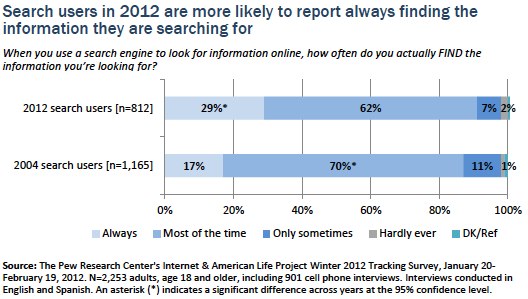
More search users report more positive experiences than negative experiences
Given the largely positive view of the quality of information search engines yield, and their own search abilities, it is not surprising that many search users report positive experiences using these tools. More than eight in ten searchers say they have learned something new or important using a search engine that really helped them or increased their knowledge. And half say they were able to find a really obscure fact or piece of information using a search engine.
Yet despite these positive occurrences, many respondents also report having experienced the downside of search. Four in ten searchers say they have gotten conflicting or contradictory search results and could not figure out what information was correct. About four in ten also say they have gotten so much information in a set of search results that they felt overwhelmed. About one in three have had the experience of discovering that really critical or important information was missing from search results they got.
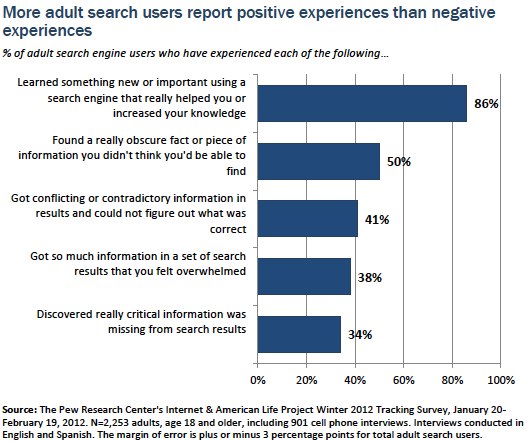
The experiences search engine users report vary slightly by education level, sex, and age. For example, college educated search engine users are more likely than those with less education to report having all five of the experiences asked about in the survey. And men are more likely than women to report finding obscure facts via search engines, getting conflicting information, and discovering that critical information is missing from their results.
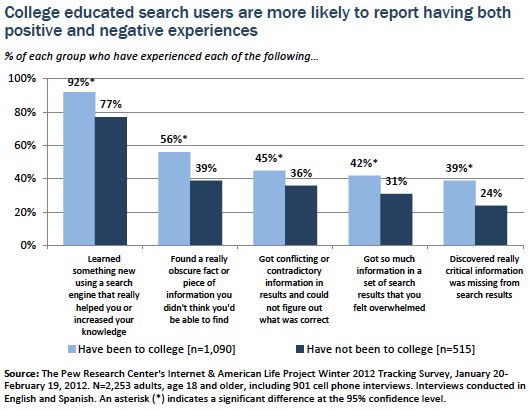
Among adult search users, one’s experiences using search engines also vary by age. Adults age 30-49, for example, are more likely than both their older and younger counterparts to report finding obscure information using search engines. Young adults, in contrast, are most likely to report getting conflicting or contradictory information in a set of results. The oldest adults, those age 50 and older, are most likely to report feeling overwhelmed by the amount of information in search results and least likely to report finding that critical information was missing from their search results.
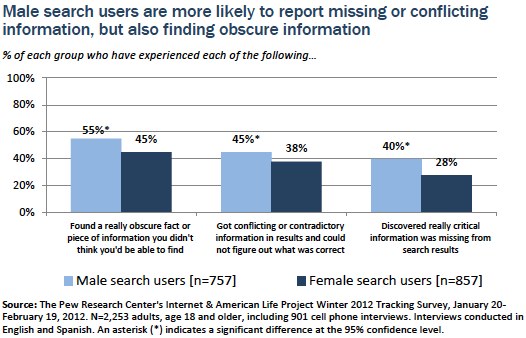
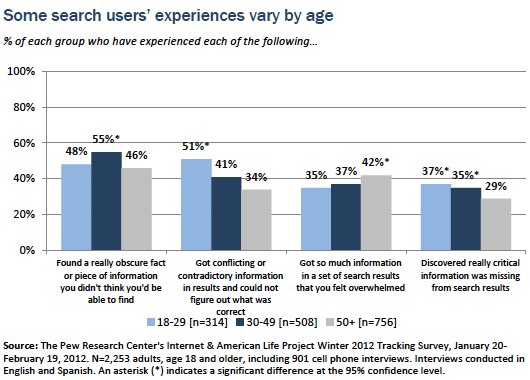
Most have negative views of search engines and other sites collecting information about them
The survey asked respondents their views of search engines and other websites collecting information about them and using it to either shape their search results or target advertising to them. Overall, attitudes toward these practices are mixed, but the majority of internet and search users express disapproval.
This is especially relevant as Google implements a new privacy policy in which information about an individual’s online behavior when they are signed in on any of Google’s sites (including its search engine, Google+ social networking site, YouTube video-sharing site, and Gmail) can be collected and combined into a cohesive user profile. As the firm put it in a blog post:
“If you’re signed in to Google, you expect our products to work really beautifully together. For example, if you’re working on Google Docs and you want to share it with someone on Gmail, you want their email right there ready to use. Our privacy policies have always allowed us to combine information from different products with your account—effectively using your data to provide you with a better service. However, we’ve been restricted in our ability to combine your YouTube and Search histories with other information in your account. Our new Privacy Policy gets rid of those inconsistencies so we can make more of your information available to you when using Google.”5
The company argues that the value of these user profiles is their ability to signal to marketers which products are likely to appeal to different individuals, thereby allowing them to target online advertising to those most likely to find it relevant and purchase products. Some privacy and consumer advocates argue that many consumers do not want to have personal information about them collected and that profiling process is often confusing to consumers, who don’t know how they are being tracked and what profiling procedures determine what ads they see.
Our questions were designed to test these arguments. Two different questions probed searchers about whether they think it is okay for search engines to use information about them to rank their future search results. In the first version of the question, two-thirds of searchers feel it is a bad thing if a search engine collected information about their searches and then used it to rank their future search results, because it may limit the information you get online and what search results you see. Some 29% view the practice of tailoring search results favorably.
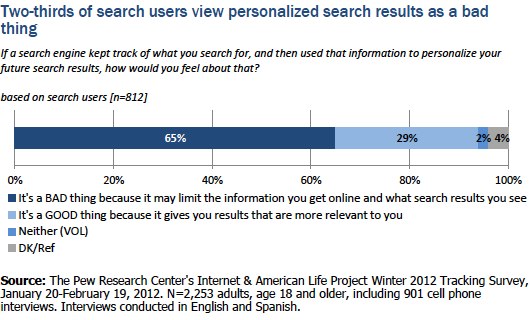
Search users’ views of search engines collecting information about them vary slightly by age, race/ethnicity, and income. Younger search users (age 18-29) tend to view the practice more favorably, as do African-American/Hispanic adults when compared with white search users. Search users in the lowest income category (household income less than $30,000 annually) are also more likely than higher income search users to say the practice of personalizing search results based on collected information about users is a good thing.
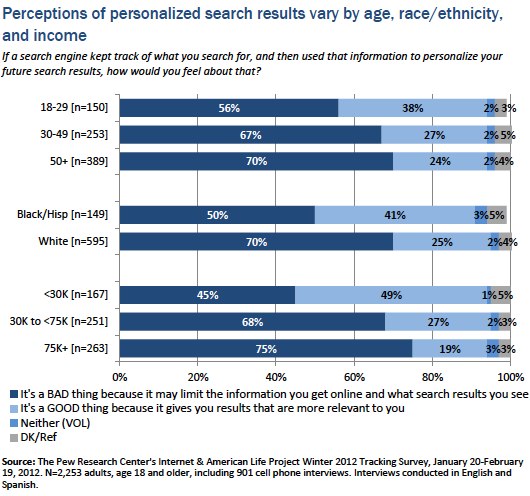
A different version of the question asking about personalized search results yields even more negative views. Almost three-quarters of searchers say they would NOT BE OKAY with a search engine keeping track of their searches and using that information to personalize their future search results because they see it as an invasion of privacy. This view holds constant across most demographic groups, with the exception of those age 50 and older, who are especially likely to view the practice negatively.
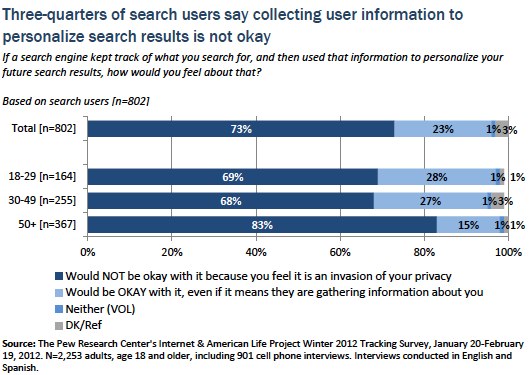
Targeted advertising: 59% of internet users have noticed it, but most don’t like it
In addition to asking search users about personalized search results, all internet users were asked whether they had noticed ads being targeted to them online and more broadly, their opinion of targeted advertising. A majority (59%) say they themselves have noticed targeted advertising online – specifically, they have noticed advertisements online that are directly related to things they had recently searched for or sites they had recently visited.
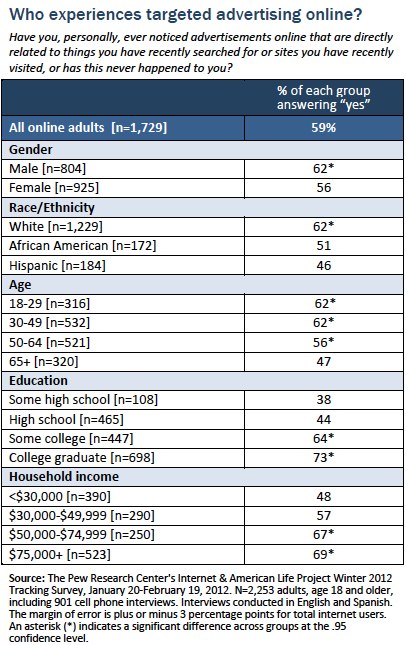
The demographic groups most likely to report noticing targeted advertising online are men, white internet users, those under age 65, those who have been to college, and those living in higher income households. Three-quarters (73%) of college graduates have noticed online ads related to things they recently searched for or sites they recently visited, significantly higher than online adults with lower educational attainment. Likewise, online adults living in households with annual incomes of $75,000 or greater are also especially likely to notice such ads, with 69% reporting having this experience.
Internet users were then asked how they feel about the practice of online targeted advertising. Roughly two-thirds of internet users (68%) have an unfavorable view of the practice, saying they are not okay with targeted advertising because they do not like having their online behavior tracked and analyzed. Some 28% said they are okay with targeted advertising because it means they see advertisements and get information about things they are really interested in.
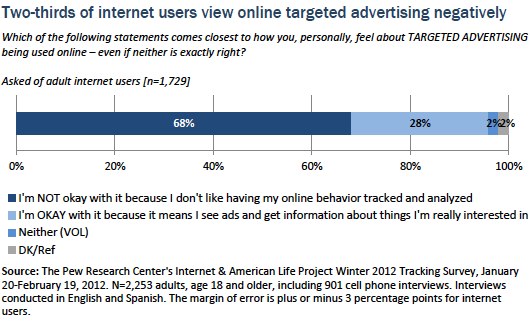
While a majority of every demographic group says they are not okay with online targeted advertising, younger internet users and those in the lowest income households are more likely than others to view the practice favorably. Yet, even among those groups, almost six in ten say they are not okay with targeted ads because they do not like having their online behavior tracked and analyzed.
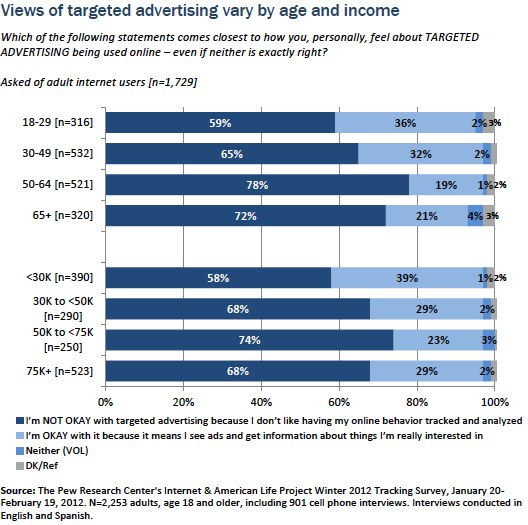
Most internet users say they do not know how to limit the information that is collected about them by a website
Just 38% of internet users say they are generally aware of ways they themselves can limit how much information about them is collected by a website. Among this group, one common strategy people use to limit personal data collection is to delete their web history: 81% of those who know ways to manage the capture of their data do this. Some 75% of this group uses the privacy settings of websites to control what’s captured about them. And 65% change their browser settings to limit the information that is collected.6
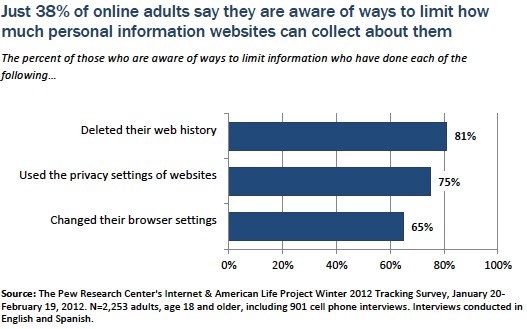
Online men are significantly more likely than women to report knowing ways to limit how much personal information websites can collect about them, as are white online adults when compared with African-Americans and Hispanics. Moreover, online adults who have been to college and those under age 50 are more likely than other online adults to report knowing how to do this.
